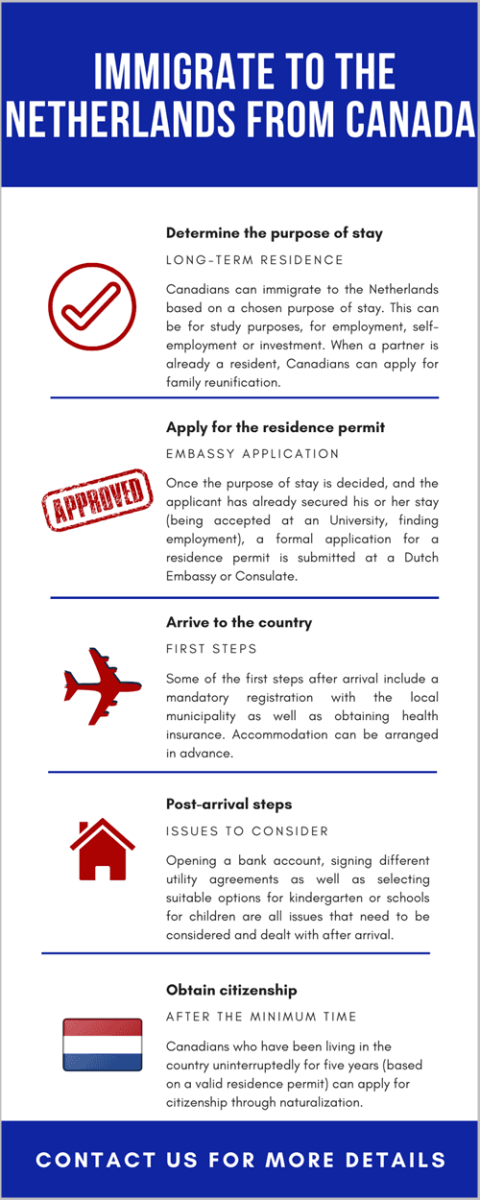The Netherlands is one of the most attractive countries in Europe for expats. Some of the main advantages include a high quality of life, good infrastructure and services and excellent connectivity to other EU countries. Canadians interested in relocating to the Netherlands have to follow a standard and uncomplicated procedure; however, several steps do remain mandatory. Because there are several methods, in which a Canadian can move to the Netherlands, it is advisable to seek advice and complete information if you want to immigrate to the Netherlands from Canada.
One important detail is that individuals coming from Canada do not need a visa to enter the Netherlands, but should prepare a valid passport and consider the rules and regulations when settling in the country. Our immigration lawyer in the Netherlands are here to provide you with details about the Dutch residence or work permit you need to obtain as soon as you arrive here.
Our team of immigration lawyers can also assist Canadians who are already in the country and are ready to apply for Dutch citizenship.
Free admittance in the Netherlands for Canadian citizens
People from Canada benefit from numerous advantages that come with the Canadian passport. One of these is related to the free entrance in numerous countries worldwide, without having to apply for a particular visa and wait for a stamp to be placed on the passport. This is also available for all individuals interested in entering the Netherlands as Canadian citizens, no matter the purpose of the visit, business or tourism. A citizen from Canada can stay in the Netherlands for 90 days and for 180 days in other Schengen states. It is good to know that working and studying in the Netherlands come with different requirements and one of them is related to the Dutch residence permit one should obtain when settling in the country. Our immigration lawyer in Netherlands will provide you with assistance and complete details about the legal forms you should consider in order to immigrate to the Netherlands from Canada.
Ways in which a Canadian can move to the Netherlands
As stated above, one way in which a Canadian resident can move to the Netherlands is for study purposes. However, this option may only be attractive for students or those who are switching careers or who are just starting their career in a chosen field. All other Canadians have other options to move to the Netherlands permanently:
- as a highly skilled migrant: a Canadian who is highly skilled in a particular field can obtain a residence permit when coming to the country and having an employment contract with a Dutch employer or research institution; intra-company transfers are also possible.
- as a self-employed individual: Canadians who wish to work independently in the Netherlands can apply for residence permit as a self-employed individual; a condition is that their activity will be of interest for the Dutch economy; the application is assessed based on a scoring system (personal experience, business plan and the added value for the Netherlands); we can give you more details about the Netherlands startup visa;
- as a start-up founder: start-up entrepreneurs can obtain a residence permit in Netherlands if they can present an innovative product or service and if they collaborate with an experienced facilitator; Dutch start-ups are subject to a wide range of incentives and the ecosystem is a supportive one.
- as an employee in art and culture: artists and performers can apply for a single permit (themselves or their employer who also becomes their sponsor); jobs can be available in dance, theater, stage performances, cultural workshops, classical music, opera and others.
Each of the options described above require that the applicant will have sufficient proven income after arriving in the country and after undertaking the employment for which he applies.
If you want to move to a particular city, you can discuss it with our immigration lawyers in Amsterdam.
Residence permit application for Canadians
Canadians do not need to apply for a provisional residence permit, they can receive the residence permit in Netherlands once their application has been processed by the Immigration and Naturalization Service (IND). A valid passport and the Canadian identification card where your home address is mentioned must be provided to the authorities in charge of issuing your Dutch residence permit. The decision period in the Netherlands for preparing your documents is a matter of weeks, meanwhile, a Canadian citizen established in the country is registered at the local police.
The IND will issue the decision to accept or refuse the application within 90 days (in case the decision is a negative one, the applicant can apply for a review). The residence permit is collected from the IND and for this purpose the holder must make an online appointment (within four months after having received the acceptance letter, at least). One of our Dutch immigration lawyers can help you with detailed information about the application for the residence permit so that you may avoid the situation in which this is rejected by the IND. If this does happen before you have had a chance to contact us, we can help you proceed with a review.
After the Canadian applicant receives his residence permit, he must handle a few key steps:
- register with the municipality: the first step after arriving to the Netherlands is to register with the municipality in which the residence is based; the registration is submitted with the Municipal Personal Records Database (BRP); the applicant will need to present a translated and legalized copy of his birth certificate.
- health insurance: any individual living in the Netherlands must have health insurance; this can be arranged within four months after the arrival in the country.
Canadians moving to the Netherlands are not required to perform a tuberculosis test.
When moving to the Netherlands based on an employment contract, the residence permit will have the same validity as the length of the employment contract but no more than five years. In the event in which the residence permit holder becomes unemployed during this time, a period of a maximum of three months is allowed for a new job search. The type of work is indicated on the back of the residence permit. For example, highly skilled migrants can either become employed as skilled workers or work as self-employed individuals. One of our immigration lawyers in Netherlands can give you more information.
Immigrants who contribute to the Dutch economy, science, or culture are more likely to be admitted to the country. The conditions for this are expressed in the Modern Migration Policy Act and they refer primarily to foreign investors, entrepreneurs who open start-ups as well as highly skilled migrants. Some of the main criteria under which the application for immigration is evaluated in the case of entrepreneurs is the type of business that is being incorporated as well as its potential to create jobs (and the number thereof). Entrepreneurs from Canada can apply for a one-year residence permit if they are able to start an innovative business in the country. For this purpose, they will need to receive the support of an experienced facilitator based in the Netherlands. This business mentor will need to sign an agreement with the Canadian entrepreneur and will need to meet a number of criteria, among which to have experience in guiding startups and be financially stable. The Netherlands Enterprise Agency has a list of recognized facilitators that is updated regularly, as needed. Our team can give you more details and examples of facilitators as well as assist you if you are interested in obtaining the Netherlands investor visa.
Foreign investors (not to be confused with the start-up entrepreneur) are required to have a capital of at least 1,250,000 Euros and invest in Dutch businesses. A points system method is commonly used in this case.
We invite you to watch a video on the immigration process:
Obtaining Dutch citizenship
Canadians who have lived in the Netherlands for an uninterrupted period of five years, during which they have held a valid residence permit at all times, are allowed to apply for citizenship through naturalization. Some of the other conditions for this include:
- minimum age of 18;
- having a valid residence permit immediately prior to the application for naturalization (for a non-temporary purpose and still valid during the naturalization ceremony);
- be sufficiently integrated: must read, write, speak and understand Dutch (the civic integration diploma is proof of this);
- no prison sentence, community service order and no large fine in the Netherlands or abroad during the last five years;
- renouncing the current nationality: this does not apply in some cases for example for those individuals married to a Dutch citizen or those who are a registered partner of a Dutch citizen.
If obtaining citizenship is a natural step you wish to take, you can always talk more about the process and requirements with our immigration lawyer in the Netherlands. Another way of obtaining citizenship is by making an investment in Netherlands and our lawyers can give you more details about this option.
We can also give you more information if your parent(s) are or were Dutch, because in this case, you may qualify for Netherlands citizenship by descent.
Living in the Netherlands
The Dutch have an excellent live-work balance, live a healthy live through sports (many of them bike and swim) and have an excellent healthcare system. The business environment welcomes foreign investors as well as encourages the employment of foreign workers and part-time employees. In addition to all these strong points, the Netherlands is also constantly included in the World Happiness Report.
Moving to the Netherlands, as well as to any other country, includes a number of mandatory steps, the ones related to visas, working and residence permits being briefly described above. Canadians who wish to immigrate to the Netherlands will also have to consider other issues in advance, such as housing, baking and taxes as well as education, for those who relocate with children who are school or high-school students in Canada (and will need to be enrolled in a Dutch public school). Canadians will find it fairly easy to exchange their driver’s license once they are registered as residents and have a valid residence permit. The Netherlands has signed a reciprocity agreement that allows holders of Class 5 driving licenses issued by the Canadian province of Alberta or Quebec to exchange their permits for a Dutch driving license.
Life in the Netherlands will include good quality goods and services as well as a rich social life. The country offers plenty of options for recreational or educative activities, festivals, and a wide range of events, as well as numerous restaurants and coffee shops. In case you want to immigrate to the Netherlands from Canada, you should know that the vibrant Amsterdam is a city chosen by many expats, however, if you are looking for different options you can also choose to relocate to Eindhoven, Leiden, Rotterdam or The Hague, among others.
The Netherlands is excellently connected to other central European countries and Canadians living in the country can soon start to explore other European cities as soon as they settle in the country.
Part of the issues that need to be taken into account when moving to the Netherlands is the fact that those who wish to become permanent residents will need to be sufficiently integrated, as stated above. This means that native English speakers will need to learn a language that poses certain challenges, however, the fact that some 93% of the Dutch citizens are good English speakers will make the integration easier.
Some interesting facts and figures about the Netherlands are listed below by our team of relocation experts:
- approximately 5,000 Canadians lived in the Netherlands in 2017, according to the Canadian Embassy in the Hague;
- almost one third of the Netherlands – or the low lands, is below sea level and approximately 60% of the population lives 5 meters below sea level;
- there are more than 15,000 kilometers of bicycle tracks and the there are twice as many bikes as cars;
- the country is one of the most densely populated countries in the world.
Immigrating to the Netherlands from Canada can be rewarding for business, career and personal purposes. Our relocation services can make it easier for those who are looking to move to the country, regardless of their reason, be it for work, reuniting with family, or studying at a Dutch university.
Canadian citizens interested in acquiring Dutch nationality can reach out to our team for detailed assistance during the naturalization process. Once you have lived in the country for five years, you may find it as a natural step to apply for Dutch citizenship. The Netherlands allows an individual to retain his or her initial citizenship. If you need more details, please reach out to us.
We kindly invite you to contact our team of experts in immigration in the Netherlands for further information about how to enter the country as an individual from Canada.
Canadian nationals who are permanent residents in the Netherlands can also take into account their option of becoming Dutch citizens. This may come as a natural step for a Canadian who has been working and living in the country, who has sufficient financial means, and, in time, who has also acquired sufficient Dutch language knowledge. If you are ready to apply for citizenship by naturalization, our team can help you.
Moving to the Netherlands is subject to different conditions, based on the applicant’s country of origin. For example, US nationals are subject to different requirements under the DAFT Treaty, an agreement between the United States and the Netherlands that allows a US investor to open a Dutch company, provided that he can maintain a minimum investment. Our team can give you more details.


